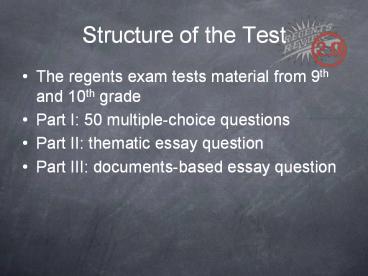Structure of the Test PowerPoint PPT Presentation
1 / 83
Title: Structure of the Test
1
Structure of the Test
- The regents exam tests material from 9th and 10th
grade - Part I 50 multiple-choice questions
- Part II thematic essay question
- Part III documents-based essay question
2
Study Strategies
- practice multiple-choice questions
- refresh your memory on key historical topics
- review essay outlines
- attend review sessions
3
- Geography
- river valleys
- mountain ranges
- deserts
- climate
- natural resources
4
(No Transcript)
5
(No Transcript)
6
(No Transcript)
7
(No Transcript)
8
(No Transcript)
9
Oil
10
Religions
- Animism
- Judaism
- Christianity
- Islam
- Buddhism
- Hinduism
- Confucianism
- Protestantism
11
(No Transcript)
12
Judaism, Christianity, Islam
- Middle East
- monotheistic
- behavior codes
13
(No Transcript)
14
(No Transcript)
15
(No Transcript)
16
(No Transcript)
17
(No Transcript)
18
Golden Ages
- Ancient Egypt
- Ancient Greece
- Ancient Rome
- India under the Gupta Dynasty
- The Islamic World
- Europe during the Renaissance
19
(No Transcript)
20
(No Transcript)
21
(No Transcript)
22
(No Transcript)
23
(No Transcript)
24
Leonardo da Vinci
25
(No Transcript)
26
Turning Points
27
(No Transcript)
28
(No Transcript)
29
(No Transcript)
30
(No Transcript)
31
(No Transcript)
32
(No Transcript)
33
The French Revolution
- The Three Estates of France in 1789
- 1st Estate (clergy)
- 2nd Estate (nobles)
- 3rd Estate (bourgeoisie, city workers, peasants)
34
(No Transcript)
35
(No Transcript)
36
(No Transcript)
37
(No Transcript)
38
(No Transcript)
39
(No Transcript)
40
(No Transcript)
41
Political Systems
- democracy
- feudalism
- absolute monarchy
- totalitarianism
42
(No Transcript)
43
(No Transcript)
44
(No Transcript)
45
(No Transcript)
46
Totalitarianism
- dictator
- secret police
- censorship
47
Economic Systems
- traditional economies
- manorialism
- mercantilism
- capitalism
- communism
48
(No Transcript)
49
(No Transcript)
50
(No Transcript)
51
(No Transcript)
52
(No Transcript)
53
Human Rights Violations
54
(No Transcript)
55
(No Transcript)
56
(No Transcript)
57
(No Transcript)
58
(No Transcript)
59
(No Transcript)
60
(No Transcript)
61
(No Transcript)
62
Threats to Our World
- disease
- overpopulation
- desertification
- deforestation
- pollution
- nuclear proliferation
63
(No Transcript)
64
(No Transcript)
65
(No Transcript)
66
(No Transcript)
67
(No Transcript)
68
(No Transcript)
69
Test-taking Strategies
70
Process of Elimination (POE)
- Eliminate choices you know are wrong
71
- Which document is an example of a primary
source? - a novel of the Age of Discovery
- a diary of a Holocaust survivor
- a textbook on Latin American history
- an encyclopedia article on Songhai culture
72
Word Association
- Identify key words in the question and match
those words with words in the choices
73
- Which statement best describes an aspect of a
command economy? - Profit motivates individuals to set up private
businesses. - Tradition, religion, and customs heavily
influence economic decisions. - Supply and demand regulate the economy
- Government directs and controls the means of
production.
74
- Finally, let us put together the things so
great and so august (exalted) which we have said
about royal authority. Behold an immense people
united in a single person behold this holy
power, paternal and absolute behold the secret
cause which governs the whole body of the state,
contained in a single head you see the image of
God in the king, and you have the idea of royal
majesty. God is holiness itself, and power
itself. In these things lies the majesty of God.
In the image of these things lies the majesty of
the prince - -Bishop Jacques-Benigne Bousset, 1679
75
- This passage suggests that the authority to rule
in 17th century France was based on - popular sovereignty
- parliamentary consent
- feudal obligation
- divine right
76
Positive/Negative
- Decide if the question requires a positive or
negative answer and look for choices that are
positive or negative
77
- The Golden Age of Muslim culture was best known
for its - Attempts to colonize North America
- Frequent conflicts between Christians and Jews
- Advances in mathematics, science, and medicine
- Policies to reduce trade between the Middle East
and China
78
Thematic Essay
- read the historical context and the task
carefully so you know exactly what you need to do - read the suggested topics and choose the topics
you know best - write a brief outline
79
Thematic Essay Question
- Theme Change Political Events
- Twentieth-century political events have had
positive and negative effects on global history.
80
- Task
- Identify two 20th-century political events and
for each - -Discuss the historical circumstances
surrounding the event - -Evaluate the extent to which this event has had
a positive or negative effect on global history
81
- You may use any major political event from your
study of global history. Some suggestions you
may wish to consider include Lenins
establishment of a Communist government in
Russia, rise of totalitarian governments in
Europe, Ho Chi Minhs unification of Vietnam
against imperialism, increasing support for
Islamic fundamentalism in the Middle East, Mao
Zedongs Cultural Revolution in China, the
dismantling of the Berlin Wall, development of
nuclear weapons in India and Pakistan, and Nelson
Mandelas opposition to apartheid in South
Africa. - You are not limited to these suggestions.
- Do not use the United States in your answer,
although discussion of positive and negative
effects may involve the role of the United States.
82
(No Transcript)
83
Documents-BasedEssay Question
- read the historical context and the task
carefully - read the documents and answer the scaffolding
questions - write a short outline

